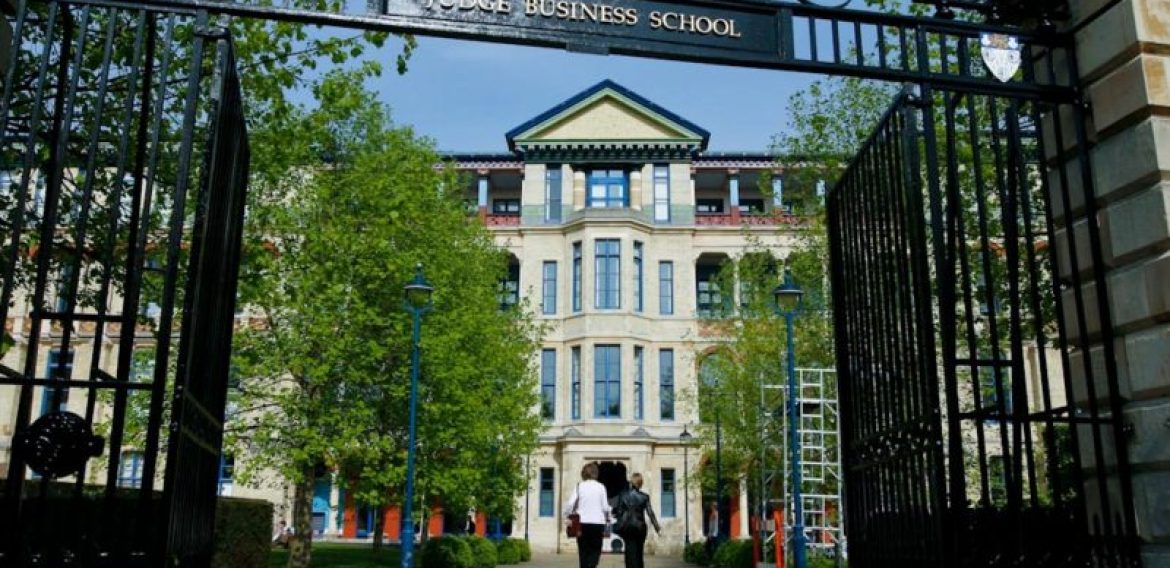Cambridge Judge Business School- Q&A with Admissions Director
Charlotte Russell-Green, Head of MBA Recruitment and Admissions, Cambridge Judge Business School
 • How has your admissions process allowed candidates to get to know the Cambridge Judge Business School and student community during the Covid times?
• How has your admissions process allowed candidates to get to know the Cambridge Judge Business School and student community during the Covid times?
It has always been of great importance for us to provide an admissions process that allows us to get to know the candidates, as well as for them to get to know the programme and the business school. Thus, it was incredibly important for us when COVID-19 hit to be able to provide that same opportunity through regular online events that feature taster lectures from faculty, presentations on the careers provision as well as Q&A sessions with current students and alumni for candidates to get their questions answered. One of the great benefits to this is that candidates are now not bound by their location and can attend Open Days despite not being in Cambridge, and if they are unable to make the time, the sessions are recorded and circulated.
• What was your deferral approach for your newly admitted students due to COVID in 2020? Do you have plans for increasing enrollment for the classes of 2023 & 2024?
We understood right from the start that COVID caused a lot of anxiety and concern for our incoming class, with some being directly affected by the virus, and so our approach was to be understanding and flexible. We provided a blended learning format with some modules online, which allowed for us to be flexible with the arrival date in Cambridge. We also allowed students to defer right up until the last minute if they needed to.
Going forward, our class size will always be circa. 200 with a maximum of 230 – it provides the optimal learning environment for our students and allows them to build meaningful relationships with their classmates as well as a broad, international network.
• Walk us through the life of an application in your office. What happens between the time an applicant clicks “submit” and the time the committee offers a final decision (e.g. how many “reads” does it get, how long is each “read,” who reads it, does the committee convene to discuss it as a group, etc.)?
Once the application deadline passes, each application is assigned a reader for the first round of reviews and that reader makes a recommendation: interview, wait list or unsuccessful. The readers are members of the recruitment and admissions team, and sometimes members of the careers team. The applications are then reviewed a second time by me and the final recommendation is then signed off. If after this review there are candidates that we want to interview that do not meet the minimum academic requirement or have a low GMAT, then they are discussed by the Admissions Committee.
• How does your team approach the essay portion of the application specifically? What are you looking for as you read the essays? Are there common mistakes that applicants should try to avoid? What is one key thing they should keep in mind as they sit down to write?
We get asked this a lot and it is difficult to answer without giving too much away. The essays are the opportunity for us to see how the applicant thinks, responds and reflects, as well as to get an idea as to whether they are a good fit. Ultimately, what we are looking for is an example that best answers the question and shows your capabilities, shows self-awareness and critical reflection, as well as a little bit of who you are. Common mistakes include not answering the question and mentioning another school’s name (beware of copy and paste!)
• Could you tell us about your interview process? Approximately how many applicants do you interview? Do you have any Interview tips for a Zoom call?
We used to invite our interviewees to Cambridge for dinner at one of the famous Cambridge colleges but due to COVID-19 unfortunately, we’ve had to move everything online. We do, however, provide an extremely robust and informative online interview experience that includes a welcome from the Director, a presentation from the Head of Careers, a Q&A session with alumni and current students, and of course, the interview with a member of faculty. One of the long-standing traditions of Cambridge is that everyone who studies here is interviewed by a member of faculty and it is the same for the MBA. These interviews are now conducted either by Skype or Zoom, and the tip I would give is to prepare for your location: internet connection, background, sound and/or interruptions. You want to be sure that this is all sorted well in advance so that you don’t have to worry about it on the day.
It varies each round as to how many people we interview. Round 3 is the largest round where we interview circa. 200 but the other rounds vary from 60-100 interviews per round.
• Is your MBA program test-optional for 2020-2021 and/or beyond? If yes, what other factors will you now emphasize more?
No, we still require our applicants to provide a GMAT or a GRE. When COVID-19 first struck, we were flexible due to test centre closures, however, now there are online options available.
• What is the one aspect of your program that you wish applicants knew more about?
Being a student in Cambridge is a unique and powerful experience – and one which we can only do so much justice to on our website and brochures! You have to be here and experience it to fully understand the feeling of community, the breadth of knowledge and ambition, and the life-changing impact a Cambridge education can have. Our alumni tell us what a special year their MBA was, and how their peers become such an important new family for them.
• Anything else you’d like to highlight about your MBA program or admissions process?
The Cambridge programme is notable in that if offers the broad, management degree you would expect from an MBA, with the intellectual rigour you’d expect from Cambridge, but it also delivers one of the most practical programmes there is – the MBA projects we offer, the Concentrations, the summer projects are all designed to get students ‘live learning’, working intensely with teams and real clients.



[…] Q&A with the Cambridge Judge MBA Admissions Director […]